1 Reading
Before You Read
![]() Complete these pre-reading activities to help you recognize formality and distance, and to understand conversations better.
Complete these pre-reading activities to help you recognize formality and distance, and to understand conversations better.
Formal and Informal Ways of Talking 
In Focus Questions 1 and 2, you filled in tables. Tables are a type of form that controls what we write and how much we write. When we communicate formally, we have to control the words we use to be polite or well organized. In formal speech, we also control how fast we speak and how carefully we pronounce words.
![]() Decide how formal the following communication styles are.
Decide how formal the following communication styles are.
When Roshan and Kerry are sitting in the coffee shop, Kerry said, “C’mon. You’ve gotta be kidding me. What the heck is going on? Look at all those cars. They’re at a stand still. We’re gonna be late. Darn construction…”
When Roshan and Nick were talking, Roshan said, “Hey Nick… See ya.”
When Gilles phoned Claire, he said, “Am I speaking with Mrs. Turner? Good morning… It’s Gilles Doucette here.”
![]() Place
Place ![]() for Kerry,
for Kerry, ![]() for Nick, and
for Nick, and ![]() for Gilles along the scale.
for Gilles along the scale.

Vocabulary: Multiple-meaning Words 
Many English words have two or more definitions. These words are called homographs because they are spelled the same but have different meanings.
![]() Look at the table below. One word or phrase on the right does not have the same meaning as the word on the left. Choose that word or phrase.
Look at the table below. One word or phrase on the right does not have the same meaning as the word on the left. Choose that word or phrase.
| sweet | a candy | pop | very nice | sugary |
|---|---|---|---|---|
| match | a game between two teams | a large amount of something | a marriage partner | a small stick for starting fire |
| trade | to exchange things | a kind of skilled work | to make a deal | a kind of characteristic |
Predictions
You’re going to read text messages by Roshan and his friend Nick, as well as an email from Dev Mehta (Roshan’s father). These people know each other very well; they are very close. Before reading, predict how they will talk to each other.
- Will they always be informal with each other? If not, when will they switch to formal writing?
- Will they always be direct, or blunt, with each other? If not, how will their writing show directness or indirectness?
Roshan and Kerry found that the shortest, most direct road was closed. If they had continued on that highway, they would have run into danger. They had to choose a route that was less direct. Sometimes conversations must become less direct, too. Speaking more indirectly can help speakers avoid some dialogue dangers.
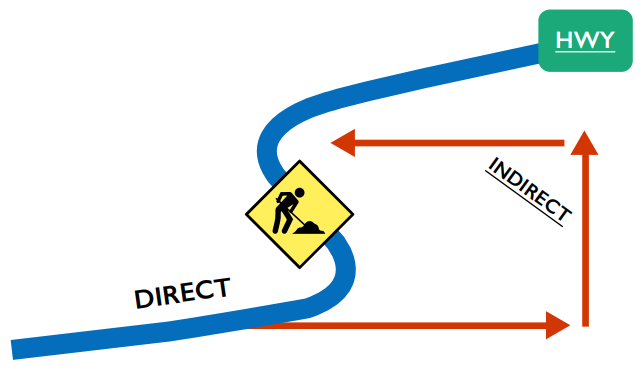
Reading 1
![]() Read the text messages sent between Roshan and his friend Nick.
Read the text messages sent between Roshan and his friend Nick.
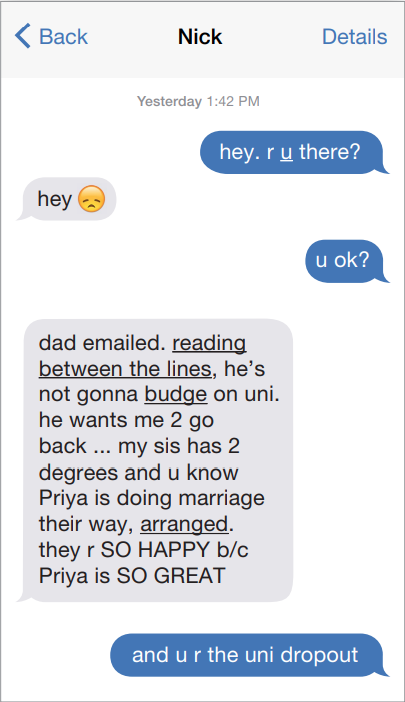
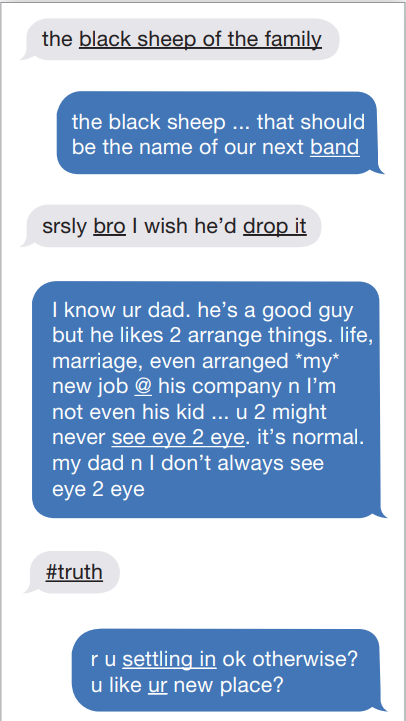
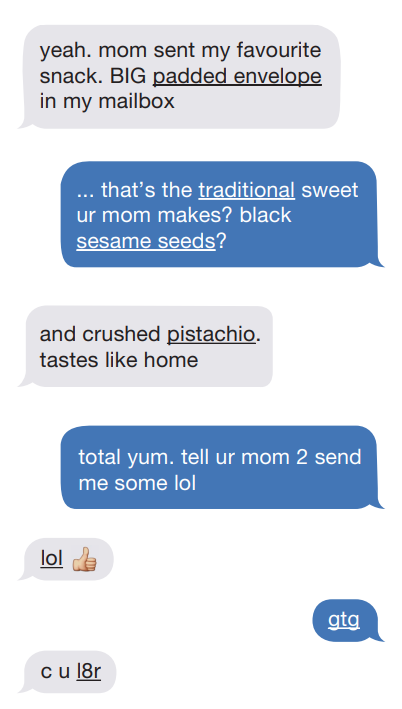
![]() Read an email from Roshan’s father.
Read an email from Roshan’s father.

From: Dev Mehta
To: Roshan Mehta
Cc:
Subject: Happy Birthday
Dear Son,
Twenty years ago today, you arrived at Lethbridge Regional Hospital. So much water under the bridge…
Your sister reports that Auntie has a good eye when it comes to husbands. I’m sure your aunt is considering more than handsome appearance. It gives your mother and I great happiness to know that Priya trusts the wisdom of her elders in choosing a life partner. Be assured that it will be our pleasure to do the same for you.
Sincerely,
Father
After you read
Comprehension 
Strategy 1: Comparing Greetings
Being close to people doesn’t only mean you are sitting beside them. You may have a close relationship with someone. You and that person may know each other very well. In the same way, being distant from people doesn’t always mean you are thousands of kilometres apart. You may feel distant from your neighbours because you don’t know them.
![]() Decide if each greeting below is for someone close or distant:
Decide if each greeting below is for someone close or distant:
- Hello, sweetheart.
- Hello? Hello, ma’am. This is Roshan with A1 Electric.
- Dear son,
- Hey. r u there?
- Dear Mr. Mehta:
Strategy 2: Recognizing Meaning
![]() Choose all the correct answers.
Choose all the correct answers.
- Roshan texts about settling in at his new place. From that clear fact, we can infer, or make a reasonable conclusion, that he moved away from his parents’ home
a) for the first time
b) a few weeks ago
c) perhaps yesterday
d) from Lethbridge
- The package from Roshan’s mom contains
a) handwriting
b) sweets
c) candy
d) seeds and nuts
Strategy 3: Restating or Paraphrasing
![]() Choose the best answer.
Choose the best answer.
- In his email, Roshan’s dad writes:
“Twenty years ago today, you arrived at Lethbridge Regional Hospital. So much water under the bridge…”
He means, in other words, that
a) today is the anniversary of Roshan’s arrival on a very wet and rainy day
b) a lot has happened since Roshan was born
c) he remembers coming over the bridge to the hospital with Roshan 20 years ago
- He also writes: “Auntie has a good eye when it comes to husbands.”
He means, in other words, that
a) Roshan’s aunt has excellent eyesight
b) another aunt, not this one, is coming to see her husband
c) Auntie notices handsome single men about Priya’s age
- Roshan texts that he is “the black sheep of the family.”
He means, in other words, that
a) he doesn’t do what his parents want or expect
b) people might describe Roshan as darker than his family members
c) he was born under the group of stars called Aries, the sheep or ram
Vocabulary
Strategy 1: Using the Context to Understand Words 
1. The word SWEET has several meanings. Each sentence below has a word that could be replaced by SWEET.
![]() Identify the word that means SWEET in each of the sentences below.
Identify the word that means SWEET in each of the sentences below.
a) “Good morning, my dear. Would you like sugar in your coffee?”
b) “You’re coming home to see your father and me? Fantastic!”
c) “I’m supposed to cut down on sugary drinks and snacks.”
d) Roshan ate one candy after another until the package was empty.
2. Verbs, or action words, such as DROP may combine with a preposition or pronoun to make a phrase. The meaning of the phrase is not exactly the same as the verb alone.
![]() Identify the preposition or pronoun that can be used to fill in the blank after the verb DROP in each sentence below. Fill in each blank with one of the following prepositions or pronouns: BY, IT, OFF, OUT.
Identify the preposition or pronoun that can be used to fill in the blank after the verb DROP in each sentence below. Fill in each blank with one of the following prepositions or pronouns: BY, IT, OFF, OUT.
a) Many first-year university students stop studying before a term is over. They drop .
b) Roshan never travelled to his aunt’s home without a plan. He never just dropped .
c) When Roshan argued with his dad, his mother would say, “Just drop .”
d) Kerry pulled over to the side of the road to drop Roshan .
Strategy 2: Matching Meanings 
Part 1
![]() Match the informal words or expressions on the left to the formal ways of saying them on the right.
Match the informal words or expressions on the left to the formal ways of saying them on the right.
| Informal | Formal |
|---|---|
| bro | sister |
| gonna | university |
| hey | brother |
| sis | hello |
| uni | going to |
Part 2
![]() Match the text abbreviations on the left to their full forms or meanings on the right.
Match the text abbreviations on the left to their full forms or meanings on the right.
| Abbreviations | Meanings |
|---|---|
| b/c | are |
| howz | because |
| lol | I’ve got to go. |
| c | laugh out loud = very funny |
| gtg | later |
| l8r | how is |
| r | see |
Part 3
![]() Match the text abbreviations on the left to their full forms or meanings on the right.
Match the text abbreviations on the left to their full forms or meanings on the right.
| Abbreviations | Meanings |
|---|---|
| srsly | your |
| u | Excellent! or Yes! |
| ur | seriously |
| #truth | you |
| @ | that’s true |
| 2 | at |
| 4 | to |
| for |
Discussion
The writing of Roshan, his friend, and his father may show their close relationship. But they don’t always say exactly what they mean (they aren’t always direct with each other).
NOTICE formal and informal words and expressions. FIND examples of who uses formal or informal writing.
DISCUSS why the family members used different levels of formality.
Did anything surprise or confuse you?
How did you feel about Dev’s level of formality with his son?
What reasons can you think of that Dev might be formal with his son?
FIND examples of idioms or other phrases that have an indirect message.
What do they mean?
What is the writer really trying to say?
DISCUSS why you feel the family members used different kinds of directness.
How do you feel when people are very direct?
How do you think about (perceive) people who are very direct?
How do you think about (perceive) people who are very indirect?
Which communication style is more familiar or comfortable to you — direct or indirect?
THINK about your relationships outside of English class.
TALK about people who write to you.
Is their style formal or informal?
How do you feel when someone you expect to be informal is formal instead?
How do you think about (perceive) people who usually write very formally?
How do you think about (perceive) people who usually write very informally?
TALK about your own writing.
Who gets formal messages from you?
Who gets informal messages?
When do you choose to write more formally or informally?
How do you want people to think about (perceive) you in your writing?
Extension Activity 
Learning a language doesn’t only happen in a classroom. One of the best ways to learn how to use new words and expressions is to log, or record, how people use these words in your own community. You can do this through listening or reading.
You can print pages of the Language Observer Log and Language User Log to help you extend, or stretch, your language learning into daily life.
Here is a sample Language Observer Log. A student named Abdi recognized the word “elders” in the email Roshan got from his dad. He noticed, or observed, that “elders” is a word that people used outside of his class. Read his log below.
| SAMPLE Language Observer Log | Name: Abdi | ||
| Date: May 17, 2016 | |||
| Lesson word | Words or expressions with similar meanings | Where you read or heard it | Who said it or who wrote it |
| 1. elders | 1. older, wiser, people
2. leaders |
On the TV news about First Nations | A young woman said she was learning the Cree language from her elders. |
|
|
|||
Reading progress check 
![]() Read the questions and answers before reading the text messages on the next page. This is a strategy to help you locate the answers more easily. After you read the text messages, answer the questions.
Read the questions and answers before reading the text messages on the next page. This is a strategy to help you locate the answers more easily. After you read the text messages, answer the questions.
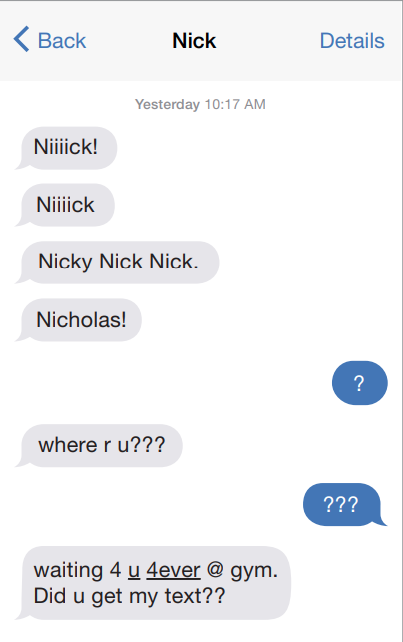
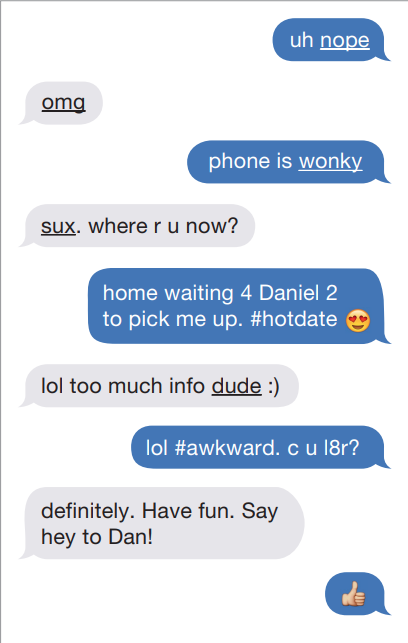
- Choose one. Roshan is annoyed with Nick. How does Roshan adjust his greeting to show he is annoyed?
a) He says only Nick’s full name.
b) He repeats Nick’s name.
c) He uses Nick’s family name.
d) None of the above.
- Choose two. Roshan uses a lot of question marks (???) in his texts to show he is
a) annoyed
b) confused
c) awkward
d) surprised
- Choose two. Roshan is upset because
a) Nick cancelled their plans
b) he thinks Nick forgot their plans
c) he’s been waiting a long time
d) Nick didn’t apologize
- Choose one. Roshan texts “omg” to show he is
a) annoyed
b) disappointed
c) awkward
d) surprised
- Choose one. We know that Roshan is familiar with Daniel because Roshan says,
a) “definitely.”
b) “Say hey to Dan!”
c) “Have fun.”
d) “too much info dude”
- Choose one. The end of the conversation is best described as
a) awkward
b) annoyed
c) disappointed
d) playful

